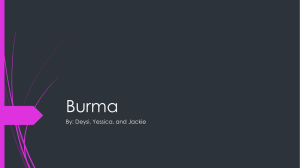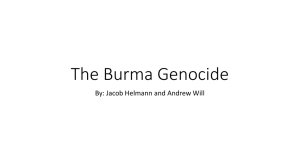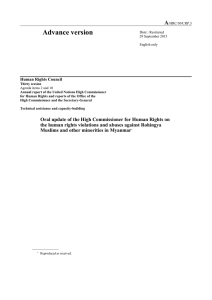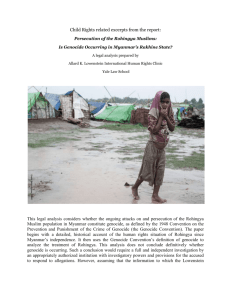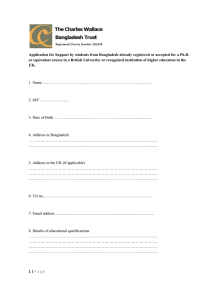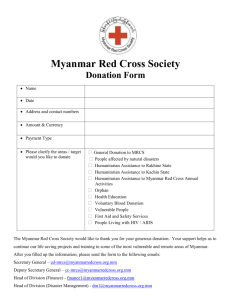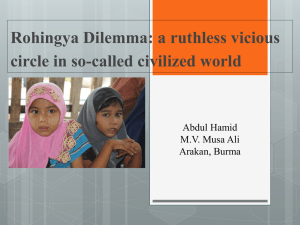UN Commission on Human Rights Working Group on Minorities
advertisement
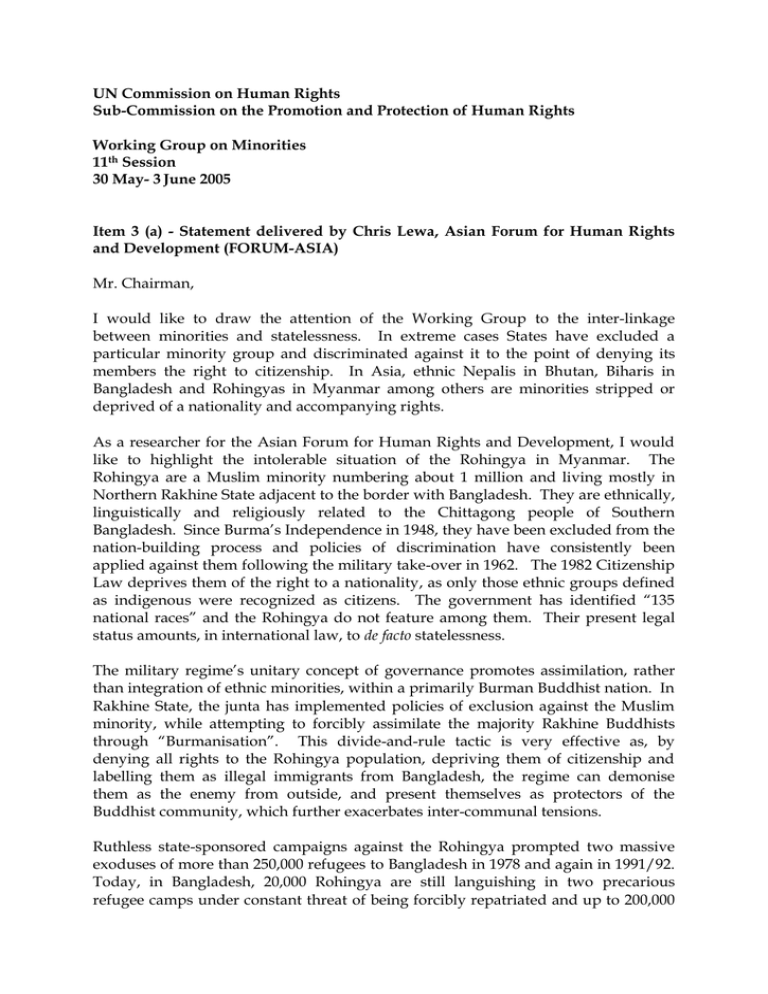
UN Commission on Human Rights Sub-Commission on the Promotion and Protection of Human Rights Working Group on Minorities 11th Session 30 May- 3 June 2005 Item 3 (a) - Statement delivered by Chris Lewa, Asian Forum for Human Rights and Development (FORUM-ASIA) Mr. Chairman, I would like to draw the attention of the Working Group to the inter-linkage between minorities and statelessness. In extreme cases States have excluded a particular minority group and discriminated against it to the point of denying its members the right to citizenship. In Asia, ethnic Nepalis in Bhutan, Biharis in Bangladesh and Rohingyas in Myanmar among others are minorities stripped or deprived of a nationality and accompanying rights. As a researcher for the Asian Forum for Human Rights and Development, I would like to highlight the intolerable situation of the Rohingya in Myanmar. The Rohingya are a Muslim minority numbering about 1 million and living mostly in Northern Rakhine State adjacent to the border with Bangladesh. They are ethnically, linguistically and religiously related to the Chittagong people of Southern Bangladesh. Since Burma’s Independence in 1948, they have been excluded from the nation-building process and policies of discrimination have consistently been applied against them following the military take-over in 1962. The 1982 Citizenship Law deprives them of the right to a nationality, as only those ethnic groups defined as indigenous were recognized as citizens. The government has identified “135 national races” and the Rohingya do not feature among them. Their present legal status amounts, in international law, to de facto statelessness. The military regime’s unitary concept of governance promotes assimilation, rather than integration of ethnic minorities, within a primarily Burman Buddhist nation. In Rakhine State, the junta has implemented policies of exclusion against the Muslim minority, while attempting to forcibly assimilate the majority Rakhine Buddhists through “Burmanisation”. This divide-and-rule tactic is very effective as, by denying all rights to the Rohingya population, depriving them of citizenship and labelling them as illegal immigrants from Bangladesh, the regime can demonise them as the enemy from outside, and present themselves as protectors of the Buddhist community, which further exacerbates inter-communal tensions. Ruthless state-sponsored campaigns against the Rohingya prompted two massive exoduses of more than 250,000 refugees to Bangladesh in 1978 and again in 1991/92. Today, in Bangladesh, 20,000 Rohingya are still languishing in two precarious refugee camps under constant threat of being forcibly repatriated and up to 200,000 are surviving illegally in slums and villages without any protection or humanitarian assistance. Moreover, thousands have been smuggled to other countries such as Pakistan, Malaysia, Saudi Arabia, etc. In addition to denial of citizenship, other policies of discrimination are imposed against the Rohingya in Myanmar in order to contain them and maintain underdevelopment. 1) Restrictions on freedom of movement: The Rohingya are subject to strict restrictions of movement hampering their access to markets, employment, health and education. They are virtually confined to their village tracts as they need to apply for a travel pass even to visit a neighbouring village, which they have to pay for. Travelling beyond Northern Rakhine State is totally prohibited. 2) Obstacles to family development: A series of measures have been imposed to limit expansion of the Rohingya population. Unlike other people of Myanmar, the Rohingyas must apply for permission to get married, which is only granted in exchange for high bribes and can take up to several years to obtain. Parents are charged fees to register their children’s birth. Moreover, extending existing dwellings and even housing maintenance and repair also require authorisation, resulting in overcrowded living conditions. 3) Construction of “model villages”: The establishment of “model villages” to resettle Buddhists onto Muslim land has been ongoing and such demographic engineering is designed to alter the ethnic composition of the region. In addition to land confiscation, the Rohingyas are also subject to forced labour to build houses for the new settlers. 4) Forced labour: As documented by the ILO, forced labour is widely practised in Myanmar for the construction and maintenance of army camps, road building, portering, sentry duty, the establishment of villages for new settlers, for military-owned plantations, for brick-baking, for collection of wood and bamboo, etc. In Northern Rakhine State, non-Muslims are usually exempt from this duty. 5) Arbitrary taxation: Arbitrary taxation and other forms of extortion are common practices. These informal taxes range from cattle registration fees to a multitude of ad-hoc donations to be made to the authorities in kind or in cash. 6) Control of the economy through a monopoly system: Business monopolies are granted in exchange for licences obtained against high bribes. All economic sectors are controlled through this monopoly system, which totally forbids any free-enterprise initiative. 7) Neglect of public services: All public services, already minimal in Myanmar, are particularly neglected in Northern Rakhine State. As non-citizens, Rohingya are barred from government employment such as teaching or nursing. Buddhists are thus appointed in these sectors but generally resent working in Muslim areas. The few educational and health facilities available are often left unattended. Mr. Chairman, In Myanmar, the Rohingya are told “Bengali, go back to your country!”, and in Bangladesh, they are told: “Burmese, go back to your country!” Their plight can be resumed in three questions that Rohingya refugees in Bangladesh have often asked: “Who am I? Where should I go? What should I do?” The Rohingya cannot be ignored. FORUM-ASIA therefore calls on the members of the Working Group: - To urge the Government of Myanmar to end its policies of exclusion and discrimination against the Rohingya and to repeal or amend the 1982 Citizenship Law; - To ensure that the Government of Myanmar incorporates the rights of minorities, whether indigenous or not, into any future constitution and laws; and, - To urge the Government of Bangladesh to cooperate with UNHCR and to protect Rohingya refugees rather than pressuring them into repatriation. As already suggested during the Sub-Regional Seminar in Sri Lanka in November 2004, we also recommend the Working Group: - To pay special attention to minorities who have been rendered stateless; and - To consider addressing the inter-linkage between minorities, statelessness and refugee outflows in a future study. Thank you, Mr. Chairman.



